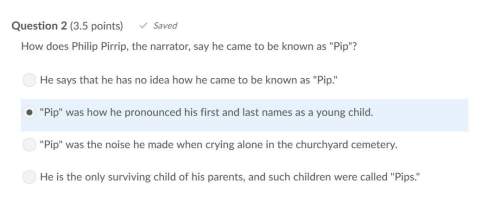Correct answer only !
my father's family name being pirrip, and my christian name phili...

Correct answer only !
my father's family name being pirrip, and my christian name philip, my infant tongue could
make of both names nothing longer or more explicit than pip. so, i called myself pip, and came
to be called pip.
i give pirrip as my father's family name, on the authority of his tombstone and my sister—
mrs. joe gargery, who married the blacksmith. as i never saw my father or my mother, and
never saw any likeness of either of them (for their days were long before the days of
photographs), my first fancies regarding what they were like, were unreasonably derived from
their tombstones. the shape of the letters on my father's, gave me an odd idea that he was a
square, stout, dark man, with curly black hair. from the character and turn of the inscription,
"also georgiana wife of the above," i drew a childish conclusion that my mother was freckled
and sickly. to five little stone lozenges, each about a foot and a half long, which were arranged
in a neat row beside their grave, and were sacred to the memory of five little brothers of mine—
who gave up trying to get a living, exceedingly early in that universal struggle—i am indebted
for a belief i religiously entertained that they had all been born on their backs with their hands
in their trousers-pockets, and had never taken them out in this state of existence.
ours was the marsh country, down by the river, within, as the river wound, twenty miles of
the sea. my first most vivid and broad impression of the identity of things, seems to me to have
been gained on a memorable raw afternoon towards evening. at such a time i found out for
certain, that this bleak place overgrown with nettles was the churchyard; and that philip pirrip,
late of this parish, and also georgiana wife of the above, were dead and buried; and that
alexander, bartholomew, abraham, tobias, and roger, infant children of the aforesaid, were
also dead and buried; and that the dark flat wilderness beyond the churchyard, intersected with
and mounds and gates, with scattered cattle feeding on it, was the marshes; and that
the low leaden line beyond, was the river; and that the distant savage lair from which the wind
was rushing, was the sea; and that the small bundle of shivers growing afraid of it all and
beginning to cry, was pip.
"hold your noise! " cried a terrible voice, as a man started up from among the graves at the
side of the church porch. "keep still, you little, or i'll your throat! ”
question 2 (3.5 points)
how does philip pirrip, the narrator, say he came to be known as "pip"?
question 2 options:
a. he says that he has no idea how he came to be known as "pip."
b. "pip" was how he pronounced his first and last names as a young child.
c. "pip" was the noise he made when crying alone in the churchyard cemetery.
d. he is the only surviving child of his parents, and such children were called "pips."


Answers: 3


Another question on English

English, 21.06.2019 21:00
For which cause did swift not write? the tory government the devaluation of irish coins the whig wars under william iii the starvation in ireland
Answers: 3

English, 21.06.2019 23:30
The bus driver who, only works weekdays, always waits for me when i'm running latecorrect the comma sandwich
Answers: 1

English, 22.06.2019 02:10
London includes a quote about john thornton as he is observing hal attempt to motivate the exhausted dogs "it was idle, he knew, to get between a fool and his folly". if the word "idle" is defined as "of no real worth, importance, or significance", what does this statement mean with regard to hal? who is the fool? what is hal's folly? why would john thornton think it of no real worth or useless to intervene?
Answers: 3

English, 22.06.2019 04:20
With crack on crack of thunder, zeus let fly a bolt against the ship, a direct hit, so that she bucked, in reeking fumes of sulphur, and all the men were flung into the sea. they came up 'round the wreck, bobbing a while like petrels on the waves. no more seafaring homeward for these, no sweet day of return; the god had turned his face from them. –the odyssey, homer read the passage. then, identify the theme that is supported by the passage. most ships cannot survive a terrible thunderstorm. the ocean is an angry beast that will tame any who try to control it. the gods have the power to control human destiny. men are willing to die to eat the delicious cattle of the gods.
Answers: 1
You know the right answer?
Questions











Computers and Technology, 24.12.2020 16:10

Computers and Technology, 24.12.2020 16:10


Computers and Technology, 24.12.2020 16:10




Computers and Technology, 24.12.2020 16:10





